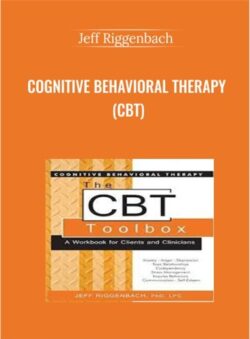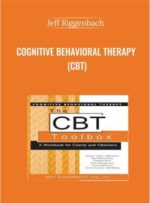The CBT skills training opportunity you’ve been waiting for…Do you have a client who everyone else has given up on?They’ve seen multiple therapists, without the relief they want and deserve. Maybe you feel stuck with this client — and at this point, even the client believes they are not capable of getting better.You can offer them hope…with powerful and practical interventions that are proven to WORK.Evidence points to Cognitive Behavioral Therapy (CBT) as the single most effective treatment for many chronic, recurring, and challenging mental health conditions including depression, anxiety, addiction, personality disorders, OCD, PTSD, trauma and more.In this intensive CBT certificate course, you’ll master a fresh set of clinical tools and skills that will transform your practice. This is NOT a “one-strategy-fits-all” approach. Rather, this online CBT course offers you a complete collection of practical ways to integrate empirically supported techniques into your very next session.In this 6-week intensive certificate course, you’ll master the skills and competencies of CBT, preparing you to apply CBT with a wide variety of clinical populations.CBT expert and author Jeff Riggenbach, Ph.D., LPC, who trained at the Beck Institute of Cognitive Therapy, will guide you step-by-step through the following in-depth modules: Week 1 Introductory Concepts of CBTGet started with the fundamental core concepts of CBT. You’ll join Jeff as he examines and reveals the power of Aaron Beck’s original CBT model. He’ll then walk you through effective strategies for socializing your clients to the cognitive model and three levels of cognition.Foundations in CBTRationale for Techniques & ApproachNeurobiological FindingsOutcome StudiesTreatment ConceptsSocialization to the CBT Treatment ModelThree Levels of CognitionEliciting & Labeling DistortionsIdentify & Evaluate Automatic ThoughtsWeek 2 Cognitive ConceptualizationDive deep into cognitive conceptualization, the cornerstone of CBT that drives treatment planning, and gain a truly integrative understanding through a series of case studies and role plays. Jeff shares insight on effective CBT clinical application, including session structure and phases of treatment, before looking at some current adaptations of the cognitive model including DBT, ACT, and Schema Therapy. End the week’s training with a section on apps and technology in CBT.Cognitive ConceptualizationCase FormulationCollaborative EmpiricismSymptom Driven Treatment PlanningApplication in Clinical PracticeCase Studies/Role PlaysThe Therapeutic RelationshipSession StructurePhases of TreatmentOffshoot ModelsThird Wave ApproachesDBTAcceptance & Commitment TherapySchema TherapyTechnology in CBTSmart Phone AppsText DialoguesWeek 3 CBT for Bipolar, Depressive and Substance Use DisordersDuring week 3, you’ll move into the application of CBT to specific problems and symptom sets you see in the clinical setting, and this week will focus on bipolar and depressive related disorders as well as addiction and substance use disorders. There’s also a brief section on suicide risk assessment, documentation and cognitive components of treating suicidality.Bipolar and Depressive Related DisordersCognitive Model of DepressionBehavioral ActivationSleep HygieneActivity Monitoring & SchedulingModify Negative CognitionsGratitude & MeaningNutritional InterventionsBipolar DisorderSubstance Use DisordersImpulse Control ModelsMonitor cravings & Resist UrgesRelapse PreventionSuicidal ClientsRisk AssessmentsReasons for Living InventoriesWeek 4 CBT for Anger, Anxiety Disorders, PTSD & OCDFurther building upon the application of CBT for specific clinical conditions, this section moves into anger management, multiple anxiety disorders including panic and phobias, PTSD and OCD. Case studies will demonstrate and reinforce the application of CBT for these conditions.Anxiety DisordersGeneralized AnxietyCognitive Model of Anxiety”Worry Cure”PhobiasHierarchy WorkDesensitizationPanic DisorderCognitive Model of PanicInteroceptive StrategiesAngerCognitive Model of AngerRole of Values & “Moral Resistance”Symptom ManagementOCDIntrusive ThoughtsMetacognitive StrategiesExposure & Response PreventionPTSDProlonged ExposureNightmare Re-scriptingTrauma NarrativesWeek 5 Cluster B Personality Disorder Diagnosis and TreatmentLearn about making a personality disorder diagnosis, and examine the unique characteristics and corresponding assessment strategies. You’ll then move into application of CBT for non-borderline cluster B personality disorders including histrionic and antisocial personality disorders. Additional information on DBT and schema focused therapy will be covered.Personality Disorder TreatmentDialectical Behavior Therapy (DBT)Schema Focused TherapyPersonality Disorder DiagnosisCharacteristicsAssessment TechniquesCluster B Personality DisordersAntisocialPsychopathyBehavior ManagementHistrionicSchema ModificationConstructive Alternatives for “Getting Noticed”Week 6 Borderline Personality Disorder Diagnosis and TreatmentContinue with treatment ideas for additional cluster B personality disorders including narcissistic and borderline personality disorders. The course will conclude with additional case studies and advanced CBT strategies.Cluster B Personality DisordersNarcissisticSubtypes of NarcissismSchema Mode WorkBorderlineDBT Based StrategiesEmotion Regulation SkillsDistress Tolerance SkillsInterpersonal Effectiveness SkillsBelieve ReconstructionAdvanced StrategiesModify Deep Seeded BeliefsContinuum WorkConstruct New BeliefsInternalization ExercisesBuild ResilienceCognitive Behavioral Chain AnalysisSchema Mode WorkTag: “Cognitive Behavioral Therapy (CBT) – Jeff Riggenbach” Review. “Cognitive Behavioral Therapy (CBT) – Jeff Riggenbach” download. “Cognitive Behavioral Therapy (CBT) – Jeff Riggenbach” discount.
Cognitive Behavioral Therapy (CBT) – Jeff Riggenbach
₹5,976.00






